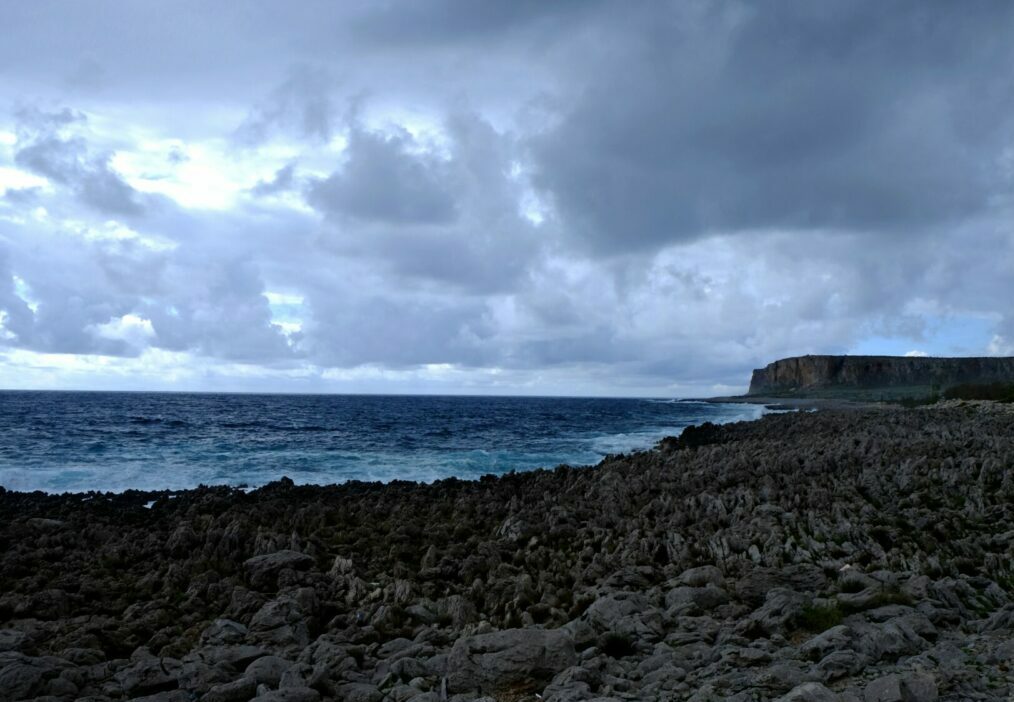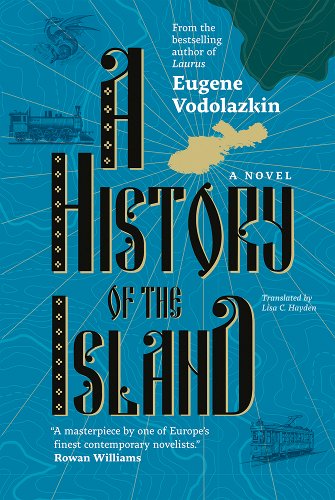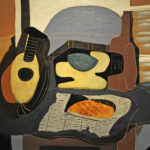Beaverhead County, MT. As with previous novels, particularly Laurus and The Aviator, Eugene Vodolazkin’s newest grapples with what it means to live in and be bounded by Time, even as much of what goes on seems incomprehensible. In his previous efforts, Vodolazkin focuses especially on laying out the nature of the problem, often leaving readers “up in the air” as to solutions. One of the great joys of reading Vodolazkin is his knack for pairing deep humility about human limitations with unapologetic ambition. A History of the Island illustrates just that combination. Vodolazkin has (I think) decided that he’s found the way forward, on the problem of Time that he’s so carefully detailed. Thus the original Russian title Opravdanie Ostrova, whose literal rendering “The Justification of the Island” provides a more concrete sense that Vodolazkin’s “History” of his fictional-yet-all-too-familiar Island arrives at some rather concrete destinations, in the end. The final scenes of The Aviator leave the book’s main character literally “up in the air,” in a failing airplane, and metaphorically so, between the 1917 Revolution and the post-Soviet Present. A History of the Island evinces far more certainty, even as it throws up its hands at any number of absurdities inherent in the human condition.
Briefly summarized, Vodolazkin’s justificatory history is told through two lenses. The first is in the style of a medieval chronicle, and the reader is handed off from chronicler to chronicler, from generation to generation. The second lens is a series of reflections from the Island’s sometime resident/sometime exilic monarchs, Parfeny and Ksenia, who are over three hundred years old, by the book’s end. Told from these two perspectives, Vodolazkin’s history spans the Island’s medieval period to its Revolution, and then to its post-revolutionary disintegration and consequent integration into the world economy of Progress, where one can buy such essential items as “novels by King, records by Sting, rhinestones, stringy thongs, and a great number of other items impossible to list.” The Island’s monarchs are there through it all, as are its monk-chroniclers, and as such they are able to provide the “long view.”
Since Vodolazkin is asking what it means to say that humans live in history, I think it illuminating to take a detour into a particular corner of the history of historical writing. That corner of which I speak was once called the “linguistic turn,” and that “turn” has in reality proved to be nothing so much as a dead end. In 1973, the renowned critic Hayden White published Metahistory. The main thrust of that influential volume was to argue that history’s “plot” predetermines the narrative, rather than that “plot” emerging from historical evidence. White’s book was a frontal assault on the reigning “Objectivity” paradigm of historical epistemology, where the narrative emerges objectively from pre-existing evidence. Having identified a number of archetypal plot structures, White went on to conclude that modern historical writing had reached a kind of narrative dead-end: pretty much all historical narratives are now Ironic, White thought. He was probably right about that; there are really no alternative plot structures palatable to we modern sophisticates. Our histories might have a Tragic flavor, were it not for the fact that our commitment to becoming “as Gods” leaches all the meaning out of the idea of hubris. We might see history as Epic, were it not for the fact that our sense of radical individual autonomy is deeply offended by the idea that our history might be leading us to a destination that we did not ourselves select. We might write Romantic history, absent our ironic conviction that nothing that glitters can be gold; we certainly cannot abide Comedic history, since to suggest that everything might turn out all right in the end—after we’ve had a good laugh about it—provides little fodder for the contemporary tendency to redefine virtue as an endless capacity for outrage. The Coen brothers brilliantly defined the archetypal Comedy in Sam Elliot’s concluding monologue in The Big Lebowski, but try writing history that way, and you’ll more than likely be cancelled for having left out some heretofore unrecognized group of the professionally oppressed. So professional history-writing finds itself in a bed of its own making. Non-professionals rarely read academic history, understandably preferring popular historical works whose narrative paradigms usually make up in dramatic joie de vivre any shortcomings in analytical sophistication.
Like Adam and Eve in the Garden, professional historiography finds itself having eaten the Apple 2.0, with decidedly underwhelming results: we’ve mostly given up on Meaning. How can we willingly engage in the kind of analytical naivete necessary to rediscover Meaning in history? To put the problem another way, how can we make sense of living in history in ways that don’t require us to write ironic conclusions to historical works, those summary paragraphs that tell us how our ideals were mistaken or trivial, that our hopes were bound to be disappointed, that our narratives are bound to be only one among many, or that the evidence is, after all that, simply “ambiguous” or “problematic”?
This is exactly the dilemma Vodolazkin sets out to solve. His history of the “island” hilariously skewers our pretensions to originality, but even as it does so, it offers an unapologetic thesis that you know, maybe there was some stuff about the medieval world that was actually better than the rhinestones and stringy thongs on offer to us Moderns. In other words, Vodolazkin turns irony against modernity itself and then offers in its place his own refreshingly naive thesis about how to think about history. Hayden White is no doubt drilling for oil in his grave, but we can leave him to it. “Won’t Get Fooled Again” may have worked for The Who, but it is somewhat limited as a constructive heuristic for those of us who living in concrete times and who must make decisions based on our understanding of history’s shape.
Vodolazkin is at his funniest when he fights fire with ironic fire. No matter who governs the island’s post-medieval government and no matter what their reigning ideology, we’ve seen it all before; we know the ignominy, brutality, and absurdity in which it will end. The Island undergoes its own proletarian revolution, for instance, and here Vodolazkin is at his merciless best: Peasant houses previously engaged in small-time capitalism become subject to the depredations of the
…special brigades that the Island’s leadership had begun sending to burgs and villages just outside the capital. Their specialty was essentially shooting those who did not wish to part with their surplus foodstuffs. A bullet was the answer to explanations that a surplus had turned into a lack long ago. As His Brightest Futurity Markel said, The time for discussions has passed. The time for discussions had passed, repeated the machine guns and that became the catchiest of the new chairman’s phrases (182).
Lest we think that intellectuals might speak out against such cynical propagandizing and terror, Vodolazkin’s former historians on the Island have become so-called
–specialists on scientific foresight, who had already been nicknamed foreseers, [and] told His Brightest Futurity about their work. They reported to the chairman that never before had their research taken on such a creative nature. That was the unvarnished truth (170).
As with Stalinist historiography, so with Socialist Realism, which likewise comes in for a hilarious fisking. The commissar for the arts, one Kasyan, states that
reality should be real—that eternal phrase determined the authorities’ attitude toward art….He recommended that painters copy photographs more frequently and that writers rewrite texts possessing a high degree of veracity: meeting minutes, for example…. Kasyan’s pathological lack of taste initially seemed like a bad joke, but it later took on more and more serious qualities. This was no laughing matter if only because the victorious bright future was doing its utmost to create a new religion….Everything that happened clearly carried a slight smell of sulphur….Back in his day, Ilary wrote about history as the struggle of good and evil. In those times it seemed as if evil had definitively triumphed, but now a monstrous antihistory is establishing itself, repeating events of previous history in broad strokes.
The great historian Yuri Slezkine has argued that Bolshevism was a millenarian cargo cult. In that spirit, Vodolazkin’s satire is quite effective: One can’t possibly take the charlatans of revolution seriously, once they have been so effectively hoisted up for public ridicule. I myself tested the limits of how far it is possible to force coffee up one’s sinuses, when I read Vodolazkin’s line that the historians’ new commitment to “creativity” (i.e. “making stuff up”) was the “unvarnished truth.”
However, as Vodolazkin recognizes, satire’s function is to clear away the drivel, to make way for something else. From a contemporary vantage point, nihilism is the only alternative. The afterword to Hayden White’s last book, The Practical Past (2014) nicely illustrated as much, 40 years after Metahistory:
But that fading into nothingness is the fate of all things whose substance is matter. Meanwhile, we need the illusion of substance—the notion that things do have substance insofar as we are capable of endowing them with such and treating them as if they deserved it insofar as they took up the challenge to act, if only from time to time and only relatively effectively, rather than submit to the authority of those claiming the right to tell us who we are, what we are supposed to do, and what we should strive for in order to be at all.
In clearer terms: White finally punted to nihilis, and argued that, well, at least we’re better off with our own meaningless attempts to make sense of the world rather than succumbing to the authority of other people’s similarly meaningless judgments. At the time, I recall being unimpressed with this denouement of White’s career; judging from Vodolazkin’s novel, he would be as well.
Vodolazkin’s proposal, I think, is to rediscover what Philip Rieff called the “vertical in authority,” and he does this through the reflections of King Parfeny and Queen Ksenia. The Island’s post-monarchical temporal rulers may have Power, but Parfeny and Ksenia have Authority, in the sense that Christ spoke with authority, and “not as the scribes,” or in Machiavelli’s argument that in obtaining power by crime, one can gain power, but not authority. In the King and Queen, the everyday inhabitants of the island have preserved the idea of the sacred, and of sacral kingship. Rieff’s notion that modernity by definition levels all verticals in authority is rejected here; clear back in his 1966 Triumph of the Therapeutic Rieff anticipated something like Charles Taylor’s later definition of modernity as the “immanent frame,” in which Vodolazkin’s rulers must be in exile. At the novel’s conclusion, the King and Queen quite literally sacrifice themselves in order to end a volcanic eruption that threatens to wipe the Island off the map for good. So how does all this add up to an answer to the problem with which this review began: that viewing history as ironic makes living in modern time essentially meaningless?
Vodolazkin’s answer is as “untimely” as they come: Meaning can emerge only by viewing man primarily in his relationship to sacred authority, Christ in specific, and we’re going to need some lesser-but-still-sacred leaders to help us out of the dead end into which modernity has led. As Vodolazkin’s chronicler-narrator says: “blessed is the land that gives birth to such rulers.” From blowhard and irredentist Presidents in the U.S. or in Russia, to the Vatican’s house Peronist, our era is characterized by the decay of established institutions and authorities, and of our trust in the same. Liberation from authority is what we’ve thought we wanted since we discovered the after-virtue-virtues of radical individualism and the consequent gods of endless possibility, whose worship consists (as Rieff noted of Herodotus) of taking a bath in the river that is not the same river twice. Seen as a kind of “afterword” to Laurus, many critics will no doubt view Vodolazkin’s History of the Island with the same cosmopolitan distaste with which they view the final, excruciatingly naive redemption scene in Dostoevskii’s Crime and Punishment. Contemporary sensibilities tend to prefer the nihilist abyss to such salvation, even as we pathetically pursue the latest “cure” for that emptiness—be that radical politics, surgical revisions to our anatomy, or compassionate medical assistance in dying. It looks patronizingly at best and with hostility at worst, at the idea that our modern despair should prompt some deep rethinking. (“Ahh, those Luddite localists,”… and so on).
Vodolazkin’s newest novel unapologetically suggests that we should do exactly that. Although my inner Thomas Paine bows to no one in its visceral tendency to reject authority, Vodolazkin reminds me of the shortsighted-ness of that view and—keeping in mind the Catholic principle of subsidiarity—suggests how much better it is to strive instead for better kings and better priests. A faint hope? Possibly. But at least in Vodolazkin, we have the third archetypal vision of legitimate authority to accompany our longed for priest and king: the prophet.
Image via Pexels.









2 comments
Rob G
This is a really good review, but should it maybe have a spoiler alert?
“White finally punted to nihilism, and argued that, well, at least we’re better off with our own meaningless attempts to make sense of the world rather than succumbing to the authority of other people’s similarly meaningless judgments.”
The problem with this view, as not a few thinkers have pointed out, is that in a clash between rival ultimately meaningless subjectivisms the one that comes out on top will not be the one that’s most logical or most “correct,” but the one that has the most power to defeat the opposition and institute itself as sovereign. Dostoyevsky was of course the prophet of this, and Southern writers (and almost exact contemporaries) Flannery O’Connor and Marion Montgomery picked up on it as well.
With Vodolazkin now following suit, it seems that Rene Girard may be correct when he opines that this sort of truth-telling is often better fitted to narrative fiction than it is to actual philosophical/political analysis. (As it happens I’ve just read Girard’s little book on Dostoyevsky, and some of its arguments are quite pertinent here.)
Aaron
Funny you mention Girard, Rob. I’m just about to start rereading “Violence and the Sacred.” I’ve never read his book on Dostoevskii, though; I should do that. Certainly the broad history of Russian literature illustrates the importance of literature as the medium where the Truth is best discussed.
Aaron
Comments are closed.